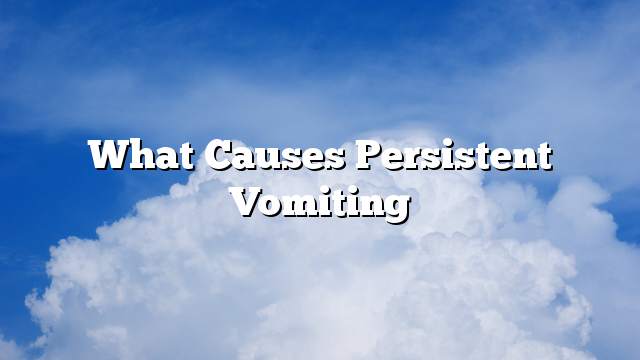Vomiting is a phrase that describes expelling the contents of the stomach strongly through the mouth or nose at times, and usually associated vomiting with nausea is a feeling of discomfort before vomiting. Persistent vomiting, whether for adults or children, is a group of causes for a long and continuous period. Here are some of the most important causes of vomiting.
Gastroenteritis, gastroenteritis or food poisoning, may be the result of over-eating, obstruction of the gastrointestinal tract, peptic ulcer, inflammation of the abdominal membranes, lactose intolerance, appendicitis, pancreatitis , Inflammation of the gallbladder, bladder stones, liver diseases such as hepatitis, otitis, nervous system, migraine, brain injury, stroke and hemorrhage within the brain, brain tumors, high blood pressure, high or low sugar In the blood, accumulation of urea.
It may be caused by pregnancy in the morning, or infection with viral infections or chickenpox, as well as taking some types of drugs as antidepressants, and exposure to radiation therapy for vomiting, and drug abuse leads to vomiting, as well as eating disorders such as bulimia nervosa and anorexia nervosa , Anxiety, fear, emotional violence, poisoning and many more.
The blood that may accompany vomit refers to cases that require a doctor to diagnose the condition immediately and to find appropriate treatment for this condition, indicating the infection of the ulcer, or the presence of ruptured blood vessels, or bleeding in the stomach, and may be a cause of cancer, With dizziness.
One of the most common complications associated with vomiting is dryness due to the expulsion of a lot of food and fluids outside the body, accompanied by dry mouth, fatigue, dark urine color, and lack of urination.
It is recommended that some tips after vomiting, such as drinking fluids to compensate for the loss of the body, provide the basic food and important, and also recommended to avoid eating before six hours after the end of vomiting, solid foods can irritate the stomach and increase the possibility of vomiting again.
The doctor usually recommends some appropriate antiretroviral drugs, it helps to reduce vomiting episodes, and some treatments such as ginger and lemon oil can be used.
Eat non-fatty foods, eat small meals throughout the day, avoid stress after eating, or eat some types of hot foods, but you must take sufficient rest during the day or at night time at night.
